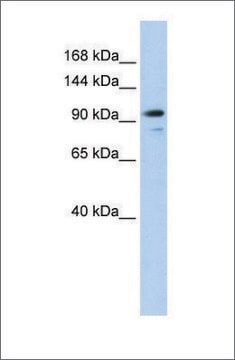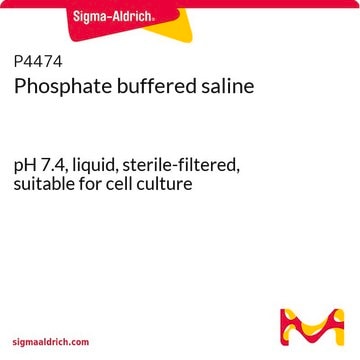ABS1024
Anti-Angiomotin Antibody
serum, from rabbit
Synonym(s):
Angiomotin
Sign Into View Organizational & Contract Pricing
All Photos(1)
About This Item
UNSPSC Code:
12352203
eCl@ss:
32160702
NACRES:
NA.41
Recommended Products
biological source
rabbit
Quality Level
antibody form
serum
antibody product type
primary antibodies
clone
polyclonal
species reactivity
human, rat, mouse
technique(s)
immunocytochemistry: suitable
western blot: suitable
NCBI accession no.
UniProt accession no.
shipped in
wet ice
target post-translational modification
unmodified
Gene Information
human ... AMOT(154796)
General description
Angiomotin is a cell surface protein that plays a central role in tight junction maintenance and the uptake of proteins at tight junctions but also appears to regulate endothelial cell response and their migration toward growth factors as well as their response to angiostatin. Thus Angiomotin plays a role in blood vessel formation, cell migration, protein localization, chemotaxis, cellular polarity and many more cell-movement/migration activities. Angiomotin is a component of a multi-protein complex associated at tight junctions that includes ARHGAP17, AMOT, MPP5/PALS1, INADL/PATJ and PARD3/PAR3 proteins. Angiomotin is expressed in endothelial cells and found in placenta, blood vessels and skeletal muscle tissue, as well as at the leading edge of lamellipodia and cellular processes.
Immunogen
Epitope: C-terminus
Recombinant protein corresponding to the C-terminus of human Angiomotin.
Application
Research Category
Signaling
Signaling
Research Sub Category
Signaling Neuroscience
Signaling Neuroscience
This Anti-Angiomotin Antibody is validated for use in Western Blotting and Immunocytochemistry for the detection of Angiomotin.
Western Blotting Analysis: A representative lot detected Angiomotin in MDCK cell lysate (Wells, C. D., et al. (2006). Cell. 125:535-548).
Immunocytochemistry Analysis: A representative lot detected Angiomotin in MDCK cells (Wells, C. D., et al. (2006). Cell. 125:535-548).
Immunocytochemistry Analysis: A representative lot detected Angiomotin in MDCK cells (Wells, C. D., et al. (2006). Cell. 125:535-548).
Quality
Evaluated by Western Blotting in HEK293 cell lysate.
Western Blotting Analysis: A 1:1,000 dilution of this antibody detected Angiomotin in 10 µg of HEK293 cell lysate.
Western Blotting Analysis: A 1:1,000 dilution of this antibody detected Angiomotin in 10 µg of HEK293 cell lysate.
Target description
~150/80 kDa observed. Uniprot describes 2 isoforms produced by alternative splicing at ~118 kDa and ~73 kDa This high molecular weight observed could be due to high phosphorylation.
Physical form
Rabbit polyclonal serum with 0.05% sodium azide.
Unpurified
Storage and Stability
Stable for 1 year at -20°C from date of receipt.
Handling Recommendations: Upon receipt and prior to removing the cap, centrifuge the vial and gently mix the solution. Aliquot into microcentrifuge tubes and store at -20°C. Avoid repeated freeze/thaw cycles, which may damage IgG and affect product performance.
Handling Recommendations: Upon receipt and prior to removing the cap, centrifuge the vial and gently mix the solution. Aliquot into microcentrifuge tubes and store at -20°C. Avoid repeated freeze/thaw cycles, which may damage IgG and affect product performance.
Other Notes
Concentration: Please refer to lot specific datasheet.
Disclaimer
Unless otherwise stated in our catalog or other company documentation accompanying the product(s), our products are intended for research use only and are not to be used for any other purpose, which includes but is not limited to, unauthorized commercial uses, in vitro diagnostic uses, ex vivo or in vivo therapeutic uses or any type of consumption or application to humans or animals.
Not finding the right product?
Try our Product Selector Tool.
Storage Class Code
10 - Combustible liquids
WGK
WGK 1
Certificates of Analysis (COA)
Search for Certificates of Analysis (COA) by entering the products Lot/Batch Number. Lot and Batch Numbers can be found on a product’s label following the words ‘Lot’ or ‘Batch’.
Already Own This Product?
Find documentation for the products that you have recently purchased in the Document Library.
Ziying Han et al.
The Journal of biological chemistry, 295(25), 8596-8601 (2020-05-10)
The Ebola virus (EBOV) VP40 matrix protein (eVP40) orchestrates assembly and budding of virions in part by hijacking select WW-domain-bearing host proteins via its PPxY late (L)-domain motif. Angiomotin (Amot) is a multifunctional PPxY-containing adaptor protein that regulates angiogenesis, actin
Michael Wigerius et al.
The Journal of cell biology, 217(2), 715-730 (2018-01-11)
The actin cytoskeleton is essential for the structural changes in dendritic spines that lead to the formation of new synapses. Although the molecular mechanisms underlying spine formation are well characterized, the events that drive spine maturation during development are largely
Our team of scientists has experience in all areas of research including Life Science, Material Science, Chemical Synthesis, Chromatography, Analytical and many others.
Contact Technical Service







